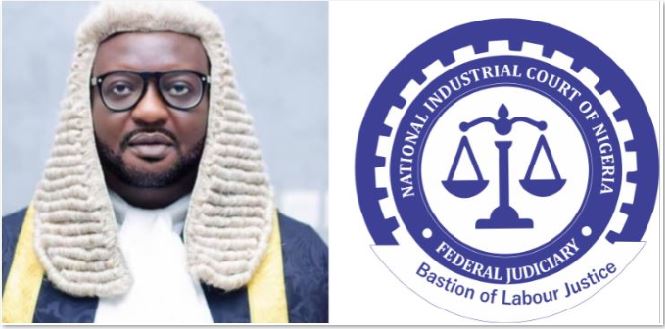The Presiding Judge, Jos Judicial Division of the National Industrial Court, Hon. Justice Ibrahim Galadima has declared the purported suspensions and employment terminations of Mr. Wulkwap Danjuma and 178 others from service of Plateau State Polytechnic by the Governor of Plateau State as unlawful, illegal, null and void.
The Court declared that the Governor of Plateau State has no power or authority to suspend, terminate, nullify or in any way interfere with the employments and appointments of Mr Wulkwap Danjuma and 178 others duly engaged in the services and employment of the State Polytechnic.
Justice Galadima granted an order reinstating Mr Wulkwap Danjuma and 178 others back to their respective positions as staff and employees of the Plateau State Polytechnic in line with their respective letters of appointments and awarded the sum of N5,000,000.00 (Five Million Naira) general damages in their favour jointly and severally for the collective pain and suffering imposed on them by the respondents, and the sum of N100,000 for cost of action.
From facts, the claimant- Mr Wulkwap Danjuma and 181 others had submitted that they were all employed by the 3rd defendant polytechnic at different times in 2022. According to the applicants, upon the change in leadership of the office of the Governor of Plateau State, the governor announced the suspension of the employments of all staff of the Plateau State Government who were employed between October 2022 to 29th May 2023, including the applicants.
Mr Wulkwap Danjuma and 181 others averred that their disengagement by the Governor of Plateau State is unsupported by any of the regulatory instruments and extant laws guiding their employments in the State Polytechnic.
In defence, the respondents- the Governor of Plateau State and 2 others averred that the employment of Mr Wulkwap Danjuma and 181 others is inconsistent with the rules and regulations of the Polytechnic as no advertisement was placed and the applicants were never interviewed by the Appointment and Promotion Committee as prescribed by the law regulating the Plateau State Polytechnic.
The respondents further posited that at the time Mr. Wulkwap Danjuma and 181 others were suspended from work, they were on probation having spent 2 years in service and yet to attain the status of permanent employees of the institution. Hence, the rules of service governing the Plateau State Polytechnic, do not fully apply to the applicants.
Learned counsel for the respondents urged the court to dismiss the case for lack of jurisdiction on the ground that the court can only entertain a suit of this nature when it is instituted by a single litigant and not a joint litigation.
In opposition, the learned counsel for the applicants further argued that the applicants’ cause of action is the same that filing separate suits will result in the multiplicity of actions, and urged the court to assume its jurisdiction and grant the reliefs sought.
In a well-considered judgment, the presiding Judge, Justice Ibrahim Galadima held that the affidavits of non-participation of the 17th, 25th, and 146th applicants filed by the respondents shall only attract the striking out of the names of the affected applicants who are not interested in the suit and not sufficient to vitiate the suit.
Justice Galadima reasoned that it would be overbearing for each of these 182 applicants (or thereabout) to institute separate actions in the same court, seeking the same reliefs against the same parties, stressed that utilizing the instrumentality of joinder of parties to determine similar matters involving several parties in a single suit, is relevant for speedy advocacy and justice.
On the main suit, the Court held that the fact that Mr Wulkwap Danjuma and 178 others were still on probation does not affect the statutory nature of their employment, that their employment can only be determined in accordance with the statutes and relevant instruments of the Plateau State Polytechnic.
Justice Galadima held that the respondents failed to satisfy the court that the Governor of Plateau State has the residual power to suspend and terminate the applicants’ employments where the Management Advisory Committee fails to do so as provided by the applicants’ terms and conditions of employment.
“Based on all available evidence, therefore, this court is not convinced that the respondents complied with the statutory provisions and regulatory stipulations regarding the suspensions and terminations of the applicants’ employments.” The Court ruled.




